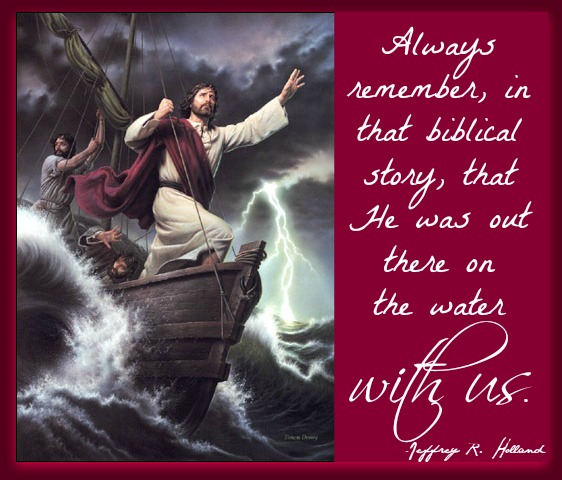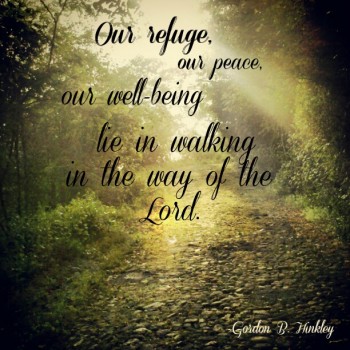The Atonement of Jesus Christ is the central doctrine of The Church of Jesus Christ of Latter-day Saints, sometimes referred to as the Mormon Church. The Book of Mormon, a book of ancient scripture that testifies of Jesus Christ, explains that the Savior’s Atonement is “an infinite atonement,” a “great and last sacrifice” to redeem the souls of all mankind (Alma 34:12-13, see also 2 Nephi 9:7). Jesus Christ did not just save those people who were alive when He was alive, nor does He save only those people who are baptized in mortality. Through baptisms for the dead, salvation is extended to all of God’s children.
Baptism: A Saving Ordinance
Latter-day Saints believe that baptism is a saving ordinance, one of several ordinances, or religious ceremonies, that must be performed in this life in order for an individual to be exalted in heaven. (See Doctrine and Covenants 128:12). Latter-day Saints also believe that baptism is by immersion in water, symbolizing the person dying and being reborn pure and free from sin. A person becomes a Latter-day Saint, or Mormon, by being baptized and then confirmed, another ordinance, a member of the Church. Being baptized is the first step on the path that leads back to live with Heavenly Father and Jesus Christ someday.However, millions and millions of people, God’s children, did not have the opportunity to be baptized while they lived on earth. Jesus Christ is perfectly merciful and just, and will not deny these people the chance to be baptized and return to live with Him again simply because they lived in a time or place without the gospel. Instead, Jesus Christ has provided a way for all of Heavenly Father’s children to receive the saving ordinances through baptisms for the dead.
Doctrine and Covenants Section 76 is an account of a vision of the kingdoms of heaven experienced by Prophet Joseph Smith and Sidney Rigdon. In this vision they saw that even those who reject Christ on earth and then again in the spirit world after death can still inherit a kingdom of glory after suffering for their own sins (having rejected the Atonement). Thus, in a way, salvation is free (2 Nephi 2:4). But for exaltation into God’s presence, repentance, belief in Jesus Christ, and saving ordinances are necessary.
What the Scriptures Say About Baptism for the Dead
In Paul’s letter to the Corinthians, he talks to the church members about Christ, how He overcame death, and how all people will be resurrected because of Christ. He then says, “Else what shall they do which are baptized for the dead, if the dead rise not at all? Why are they then baptized for the dead?” (1 Corinthians 15:29). Paul’s reference to baptism for the dead is not to explain what it is. Rather, Paul is saying that baptisms for the dead are not in vain because the resurrection is real. Latter-day Saints interpret this verse to mean that baptisms for the dead were happening anciently, and are an important part of the gospel of Jesus Christ.
The Temple
In the holy temple, Latter-day Saints perform proxy baptisms for their ancestors. The baptisms are performed in the temple because the ordinance is a sacred one, and must be performed in a holy place. Any worthy church member may enter the temple and perform baptisms for his or her ancestors; members as young as twelve can obtain a recommend to enter and perform baptisms.
Whom to Baptize
Before performing baptisms for the dead, church members must find people to baptize. First, church members research their family history and find out about their ancestors. Then, they bring these names to the temple and are baptized in behalf of their dead ancestors. The deceased ancestors have a spirit, but not a body, and cannot be baptized themselves, so instead someone else on earth is baptized for them. The spirits in heaven then have a choice to accept the ordinance. This means that a Mormon could be baptized for several deceased people, but does not mean that all of those people have become Mormons also; only if they choose to accept the ordinance.
Why Baptisms for the Dead are Performed
Latter-day Saints believe that by performing baptisms for the dead, they are extending the opportunity of baptism to those people who did not have it while they were on earth, and cannot perform the ordinance themselves. Mormons want to extend the blessings that come from being baptized to their forefathers; they want to share the happiness that they have with their ancestors. Performing baptisms in behalf of others makes it possible for all of Heavenly Father’s children to return to live with Him again, not just the ones lucky enough to live during the times when the ordinance of baptism was on the earth.
Through the mercy of Jesus Christ, it is possible for all of God’s children who have lived on earth to receive the saving ordinance of baptism. Without baptisms for the dead, many millions of God’s children would be denied the opportunity to return to live with Him again, simply because they were born in a time or place without the gospel of Jesus Christ. Heavenly Father is perfectly just, and loves all His children. Thus, all of God’s children are offered the opportunity to be baptized and receive saving ordinances.





Thank you for this well-stated explanation of baptism for the dead. Indeed, a loving God gives all the opportunity to receive the saving ordinances.